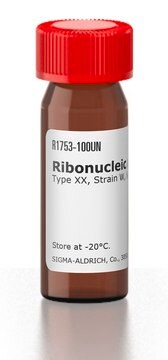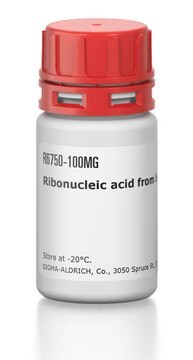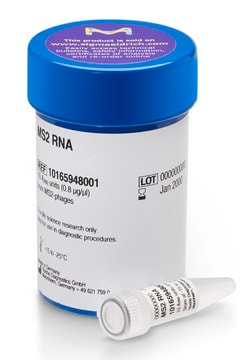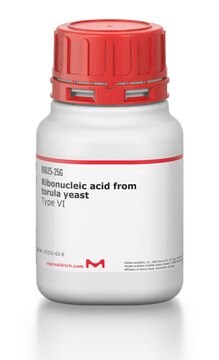R8759
Ribonucleic acid, transfer from baker′s yeast (S. cerevisiae)
Type X-SA, lyophilized powder
Synonym(s):
Transfer RNA, tRNA
Sign Into View Organizational & Contract Pricing
All Photos(3)
About This Item
Recommended Products
type
Type X-SA
form
lyophilized powder
storage temp.
−20°C
Looking for similar products? Visit Product Comparison Guide
Related Categories
Application
Ribonucleic acid, transfer from baker′s yeast S. cerevisiae may be used as a starting material for the purification of specific amino acyl-tRNA species by methods such as liquid column chromatography or high-performance liquid chromatography (HPLC).
Unit Definition
One unit will yield an A260 of 1.0 in 1.0 mL of water (1 cm light path).
Preparation Note
Prepared by a modification of the procedure of Hancher, C.W., et al., Biotechnol. Bioeng., 11, 1055 (1969).
Storage Class Code
11 - Combustible Solids
WGK
WGK 3
Flash Point(F)
Not applicable
Flash Point(C)
Not applicable
Personal Protective Equipment
dust mask type N95 (US), Eyeshields, Gloves
Certificates of Analysis (COA)
Search for Certificates of Analysis (COA) by entering the products Lot/Batch Number. Lot and Batch Numbers can be found on a product’s label following the words ‘Lot’ or ‘Batch’.
Already Own This Product?
Find documentation for the products that you have recently purchased in the Document Library.
Maureen A Sartor et al.
Nucleic acids research, 34(1), 185-200 (2006-01-07)
The recent sequencing of a large number of Xenopus tropicalis expressed sequences has allowed development of a high-throughput approach to study Xenopus global RNA gene expression. We examined the global gene expression similarities and differences between the historically significant Xenopus
Ofri Levi et al.
Nucleic acids research, 49(1), 432-443 (2020-12-12)
Modification of nucleotides within an mRNA emerges as a key path for gene expression regulation. Pseudouridine is one of the most common RNA modifications; however, only a few mRNA modifiers have been identified to date, and no one mRNA pseudouridine
Violaine I Mottier-Pavie et al.
Developmental biology, 417(1), 50-62 (2016-07-02)
The mechanisms that modulate and limit the signaling output of adult stem cell niches remain poorly understood. To gain further insights into how these microenvironments are regulated in vivo, we performed a candidate gene screen designed to identify factors that
Jaclyn M Fingerhut et al.
PLoS genetics, 15(5), e1008028-e1008028 (2019-05-10)
Intron gigantism, where genes contain megabase-sized introns, is observed across species, yet little is known about its purpose or regulation. Here we identify a unique gene expression program utilized for the proper expression of genes with intron gigantism. We find
Jean Lehmann et al.
Nucleic acids research, 41(10), 5494-5502 (2013-04-13)
The structure and function of conserved motifs constituting the apex of Stem I in T-box mRNA leaders are investigated. We point out that this apex shares striking similarities with the L1 stalk (helices 76-78) of the ribosome. A sequence and
Our team of scientists has experience in all areas of research including Life Science, Material Science, Chemical Synthesis, Chromatography, Analytical and many others.
Contact Technical Service








